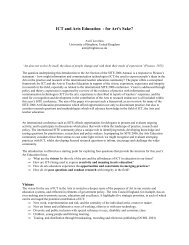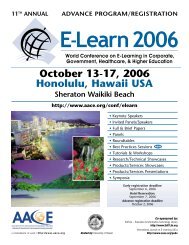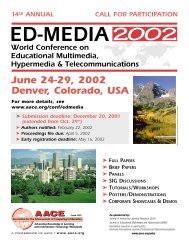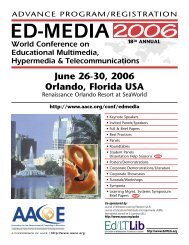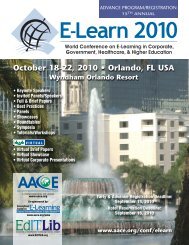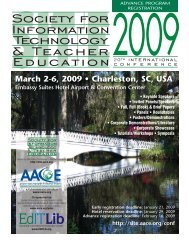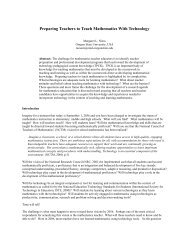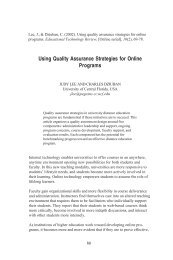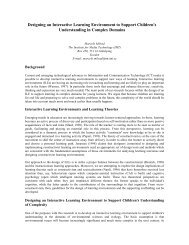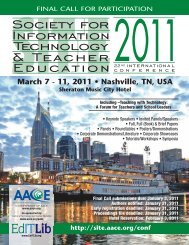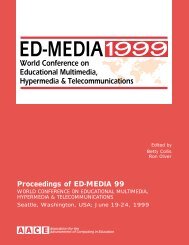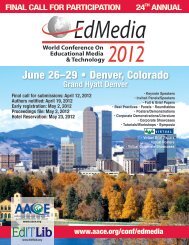June 25-29, 2007 Vancouver BC, Canada - Association for the ...
June 25-29, 2007 Vancouver BC, Canada - Association for the ...
June 25-29, 2007 Vancouver BC, Canada - Association for the ...
Create successful ePaper yourself
Turn your PDF publications into a flip-book with our unique Google optimized e-Paper software.
PRE-CONFERENCE TUTORIALS & WORKSHOPS<br />
Monday, <strong>June</strong> <strong>25</strong>, Morning, 8:30 AM – 12:00 NOON<br />
T1: Exploring Design-Based Research Methods<br />
Ron Oliver, Edith Cowan University, Australia<br />
Jan Herrington, University of Wollongong, Australia<br />
Tom Reeves, University of Georgia, USA<br />
Abstract<br />
This tutorial has been designed to help participants understand and be able to apply<br />
design-based research (DBR) approaches to explorations and inquiries into technology-supported<br />
learning and teaching. Design-based research comprises various<br />
approaches undertaken with <strong>the</strong> intent of producing new <strong>the</strong>ories, artifacts, and practices<br />
that account <strong>for</strong>, and potentially impact, learning and teaching in naturalistic settings.<br />
Design-based research provides a sound basis <strong>for</strong> meaningful and effective<br />
research that can deliver outcomes and findings which will have value and impact.<br />
Objectives<br />
Participation in this workshop will enable participants to:<br />
• understand <strong>the</strong> conceptual basis underpinning DBR approaches;<br />
• appreciate <strong>the</strong> <strong>for</strong>ms of inquiry suited to DBR approaches;<br />
• know <strong>the</strong> important steps and processes in DBR approache;<br />
• understand <strong>the</strong> processes associated with planning a DBR project;<br />
• plan a research project using a DBR approach;<br />
• evaluate DBR approaches and understand <strong>the</strong>ir potential to support quality<br />
research outoomes.<br />
Outline<br />
The workshop will follow <strong>the</strong> following <strong>for</strong>mat:<br />
• discussion and description of DBR as a research methodology (presentation).<br />
The presenters will provide an overview of DBR from a conceptual perspective<br />
highlighting <strong>the</strong> characteristic attributes and <strong>the</strong> principles underpinning<br />
<strong>the</strong> approach. The introduction will provide examples of <strong>the</strong> <strong>for</strong>ms of research<br />
suited to DBR approaches and <strong>the</strong> outcomes that can be achieved.<br />
• reviewing case studies of DBR projects (groupwork). Participants will work in<br />
small groups to review examples of DBR and to analyse <strong>the</strong> opporunties<br />
derived from <strong>the</strong> approaches employed. The review will seek to discern <strong>the</strong><br />
critical elements of DBR and <strong>the</strong> opportunities <strong>the</strong>y present to <strong>the</strong> researcher.<br />
• conceptualising a DBR approach (presentation). The presenters will describe<br />
<strong>the</strong> processes associated with planning and developing a DBR project. The<br />
presentation will highlight <strong>the</strong> critical decisions and judgments that guide <strong>the</strong><br />
planning and implementation of DBR.<br />
• planning a DBR project (groupwork). Participants will work in homogeneous<br />
groups to create plans <strong>for</strong> DBR projects based on personal interests and<br />
experience. The process is intended to develop participants' skills in applying<br />
DBR approaches in a grounded fashion.<br />
Prerequisites<br />
Audience need to have some experience in research into learning technologies ei<strong>the</strong>r<br />
as students, supervisors or academics. The workshop will assume an understanding<br />
of qualitative and/or quantitative research methodologies and previous experience in<br />
conducting research into technology-supported learning using <strong>the</strong>se methods.<br />
Intended Experience Level<br />
Beginner<br />
Instructor Qualifications<br />
Thomas C. Reeves is a Professor of Instructional Technology at The University of<br />
Georgia in <strong>the</strong> USA. Jan Herrington is an Associate Professor of Education at <strong>the</strong><br />
University of Wollongong in Australia. Ron Oliver is a Professor of Interactive<br />
Multimedia and an Associate Dean of Teaching and Learning at Edith Cowan<br />
University in Australia. Our research collaboration has been partially funded by <strong>the</strong><br />
Australian Research Council, <strong>the</strong> Australian-American Fulbright Commission, and our<br />
respective universities.<br />
Tutorials are indicated by a T# and have a lecture/demonstration <strong>for</strong>mat. Workshops are indicated by a W# and are primarily hands-on sessions.<br />
We advise early registration <strong>for</strong> all Tutorials and Workshops due to limited space available.<br />
5



